
Louis the Pious, also called the Fair, and the Debonaire, was King of the Franks and co-emperor with his father, Charlemagne, from 813. He was also King of Aquitaine from 781. As the only surviving son of Charlemagne and Hildegard, he became the sole ruler of the Franks after his father's death in 814, a position which he held until his death, save for the period 833–34, during which he was deposed.
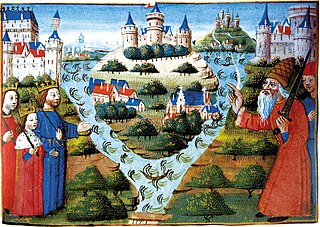
The Treaty of Verdun, agreed in August 843, divided the Frankish Empire into three kingdoms among the surviving sons of the emperor Louis I, the son and successor of Charlemagne. The treaty was concluded following almost three years of civil war and was the culmination of negotiations lasting more than a year. It was the first in a series of partitions contributing to the dissolution of the empire created by Charlemagne and has been seen as foreshadowing the formation of many of the modern countries of western Europe.
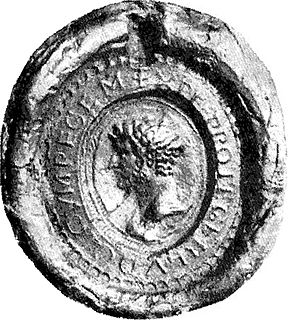
Louis the German, also known as Louis II of Germany and Louis II of East Francia, was the first king of East Francia, and ruled from 843 to 876 AD. Grandson of emperor Charlemagne and the third son of Louis the Pious, emperor of Francia, and his first wife, Ermengarde of Hesbaye, he received the appellation Germanicus shortly after his death when East Francia became known as the kingdom of Germany.

Charles the Bald, also known as Charles II, was a 9th-century king of West Francia (843–877), king of Italy (875–877) and emperor of the Carolingian Empire (875–877). After a series of civil wars during the reign of his father, Louis the Pious, Charles succeeded, by the Treaty of Verdun (843), in acquiring the western third of the empire. He was a grandson of Charlemagne and the youngest son of Louis the Pious by his second wife, Judith.
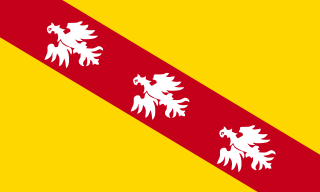
The Duchy of Lorraine, originally Upper Lorraine, was a duchy now included in the larger present-day region of Lorraine in northeastern France. Its capital was Nancy.

The Carolingian dynasty was a Frankish noble family named after Charlemagne, grandson of mayor Charles Martel and descendant of the Arnulfing and Pippinid clans of the 7th century AD. The dynasty consolidated its power in the 8th century, eventually making the offices of mayor of the palace and dux et princeps Francorum hereditary, and becoming the de facto rulers of the Franks as the real powers behind the Merovingian throne. In 751 the Merovingian dynasty which had ruled the Germanic Franks was overthrown with the consent of the Papacy and the aristocracy, and Pepin the Short, son of Martel, was crowned King of the Franks. The Carolingian dynasty reached its peak in 800 with the crowning of Charlemagne as the first Emperor of the Romans in the West in over three centuries. His death in 814 began an extended period of fragmentation of the Carolingian Empire and decline that would eventually lead to the evolution of the Kingdom of France and the Holy Roman Empire.

Lotharingia was a short-lived medieval successor kingdom of the Carolingian Empire. As a more durable later duchy of the Ottonian Empire, it comprised present-day Lorraine (France), Luxembourg, Saarland (Germany), the eastern half of Belgium and the southern half of Netherlands, along with parts of today's North Rhine-Westphalia (Germany), Rhineland-Palatinate (Germany) and Nord (France). It was named after King Lothair II, who received this territory after his father Lothair I's kingdom of Middle Francia was divided among his three sons in 855.

Louis II, sometimes called the Younger, was the king of Italy and emperor of the Carolingian Empire from 844, co-ruling with his father Lothair I until 855, after which he ruled alone.
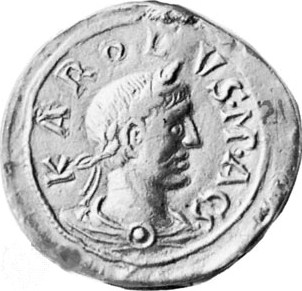
Charles III, also known as Charles the Fat, was the emperor of the Carolingian Empire from 881 to 888. A member of the Carolingian dynasty, Charles was the youngest son of Louis the German and Hemma, and a great-grandson of Charlemagne. He was the last Carolingian emperor of legitimate birth and the last to rule over all the realms of the Franks.

Francia, also called the Kingdom of the Franks, Frankish Kingdom, Frankland or Frankish Empire, was the largest post-Roman barbarian kingdom in Western Europe. It was ruled by the Franks during Late Antiquity and the Early Middle Ages. After the Treaty of Verdun in 843, West Francia became the predecessor of France, and East Francia became that of Germany. Francia was among the last surviving Germanic kingdoms from the Migration Period era before its partition in 843.

The Treaty of Mersen or Meerssen, concluded on 8 August 870, was a treaty to partition the realm of Lothair II, known as Lotharingia, by his uncles Louis the German of East Francia and Charles the Bald of West Francia, the two surviving sons of Emperor Louis I the Pious. The treaty followed an earlier treaty of Prüm which had split Middle Francia between Lothair I's sons after his death in 855.

Lothair, sometimes called Lothair II, III or IV, was the penultimate Carolingian king of West Francia, reigning from 10 September 954 until his death in 986.
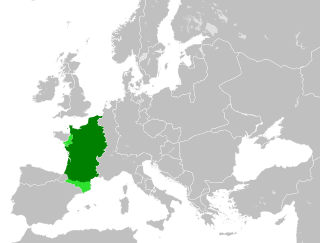
In medieval history, West Francia or the Kingdom of the West Franks refers to the western part of the Frankish Empire established by Charlemagne. It represents the earliest stage of the Kingdom of France, lasting from about 840 until 987. West Francia emerged from the partition of the Carolingian Empire in 843 under the Treaty of Verdun following the death of Charlemagne's son, Louis the Pious.

Middle Francia was a short-lived Frankish kingdom which was created in 843 by the Treaty of Verdun after an intermittent civil war between the grandsons of Charlemagne resulted in division of the united empire. Middle Francia was allocated to emperor Lothair I, the eldest son and successor of emperor Louis the Pious. His realm contained the imperial cities of Aachen and Pavia, but lacked any geographic or cultural cohesion, which prevented it from surviving and forming a nucleus of a larger state, as was the case with West Francia and East Francia.
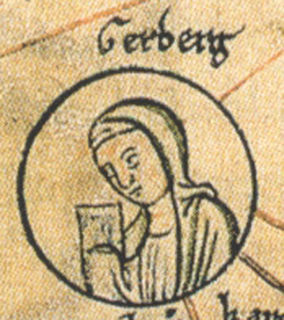
Gerberga of Saxony was a French queen who ruled as regent of France during the minority of her son Lothair in 954–959. She was a member of the Ottonian dynasty. Her first husband was Gilbert, Duke of Lorraine. Her second husband was Louis IV of France. Contemporary sources describe her as a highly educated, intelligent and forceful political player.
Hugh or Hugo was an illegitimate son of Lothair II, king of Lotharingia, by his concubine Waldrada. His father made him Duke of Alsace in 867.
The Duchy of Alsace was a large political subdivision of the Frankish Empire during the last century and a half of Merovingian rule. It corresponded to the territory of Alsace and was carved out of southern Austrasia in the last decade of the reign of Dagobert I, probably to stabilise the southern reaches of Austrasia against Alemannia and Burgundy. By the late Middle Ages, the region was considered part of Swabia.
Hucbert was a Frank and son of the count Boso the Elder. Therefore, he was a Bosonid, and the namesake for the Huberterian branch of the family. His rise to power commenced under Lothair I but continued under Lothair II, reaching its apex when his sister Theutberga married Lothair II, a prince of the Carolingian dynasty, the imperial family of Francia. Hucbert also served as the lay-abbot of the Abbey of Saint Maurice-in-Valais. This gave him control over the Mons Iovis pass, the main route between Francia and Italy. Hucbert later gained power in the region of Transjurane Burgundy (859) which is what helped him later to find safety within the kingdom of Charles the Bald.

The Franco-German war of 978–980 was fought over possession of Lotharingia and over personal honour. In the summer of 978, King Lothair of West Francia (France) launched a surprise attack on Aachen, almost capturing the Emperor Otto II, king of East Francia (Germany) and Italy. By autumn Lothair had returned to West Francia, while Otto had convoked a diet and assembled an army. To avenge his honour, Otto invaded West Francia. Unable to take Paris after a brief siege, he returned to Lotharingia. During his retreat, after the bulk of his army had crossed the river Aisne, the West Franks caught up to his baggage train and slaughtered it. In 980, the kings made peace. Lothair renounced his claim to Lotharingia.
















